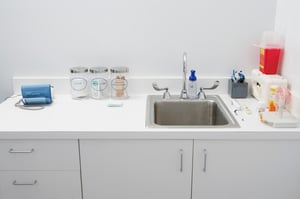Selecting the right industrial furniture for your lab can be challenging. After all, you have to take into consideration safety requirements, storage needs and function, among others.
Not all labs have the same requirements. In fact, while some may be basic, others have sterilization processes or microbial protections managers must consider when choosing laboratory furniture.
One of your top questions likely involves what material you should select for your lab cabinets and countertops. It’s a decision that requires quite a bit of thought, especially if your workspace must handle chemicals and other abrasive materials.
With hundreds of configurations possible, choosing the right cabinets and countertops is more important than ever to help you meet the demands of your laboratory.
To help you consider your options, we’ve compiled some of the different materials that are used today to construct laboratory cabinets and countertops.
Laboratory Cabinets
Using the best materials for your laboratory cabinets helps ensure a high quality workspace. 
Variations of steel, such as stainless steel, are some of the most common materials used to construct lab cabinetry. That’s because steel components are heavy duty and provide maximum strength and rigidity.
They also are an effective material choice for laboratories that require a sterile or hygienic environment both on the outside of the cabinet and inside where the shelves are located. That’s important, because the last thing you want is for liquids, bacteria, fungus or mold to penetrate your laboratory casework.
Some of the benefits of steel and stainless steel cabinets include:
- Easy to clean
- Will not chip or fade
- Extremely durable
- Moisture, heat and chemical resistant
- Sustainable
Our article, Top 6 Benefits Of Stainless Steel Cabinets, further explores some of the benefits installing stainless steel casework in your lab will provide.
But what about other materials? Can other materials be used to construct cabinets found in laboratory settings? The answer is yes, but you should ensure any material you choose meets any regulations for safety and cleanliness that your lab must follow.
In addition to metal, wood and laminate materials are sometimes used to construct laboratory cabinets. Wood offers a more traditional look, but is porous and not resistant to abrasive chemicals. Plastic laminate can be a good economical option as long as they are used in environments that don’t require extensive corrosion resistance.
Laboratory Countertops
There is a wide variety of materials used to construct countertops in laboratories. When choosing the material for your lab, consider important details such as a material’s resistance to chemicals, abrasives, heat and moisture. Cleanability and price also may influence your decision.
lab, consider important details such as a material’s resistance to chemicals, abrasives, heat and moisture. Cleanability and price also may influence your decision.
In lab environments especially, countertops take the biggest beating of all the furniture. A typical day may include working with chemicals, heat, abrasive materials and a variety of lab equipment that may damage your countertop space.
Because reconfiguring your space or replacing current countertops can be a significant investment, it’s important to choose a material that is long-lasting and durable.
Here are a few of the most common materials used to construct lab countertops:
- High Pressure Laminate (HPL Laminate) tops are used for basic, non-extreme applications. While they are functional and durable, they’re also very affordable.
- ESD Laminate work surfaces are ideal for applications where parts and materials are sensitive to static, and need protection.
- Phenolic Resin countertops typically are used in labs. What is phenolic resin? Phenolic resin is a compound that combines phenol and formaldehyde, creating large networks of permanently bonded molecules. This material is designed as one solid, lightweight countertop that is durable and long-lasting.
- Epoxy Resin tops are durable and non-porous. This work surface holds up very well under harsh and extreme conditions such as high heat.
- Solid surface countertops are durable and easy to maintain. They also feature invisible seams, making them aesthetically pleasing. How to clean solid surface countertops is a common concern, but rest assured that this material is one of the easiest to maintain and keep in top working order.
- Stainless Steel tops are resistant to bacteria, rust and corrosion. They also are stain- and heat-resistant. This makes stainless steel an ideal choice for laboratories where high heat and open flames are used.
- Butcher Block countertops are traditionally used in woodworking and basic assembly applications. While this type of countertop is sturdy, it’s also porous and can dent easily. This type of material likely isn’t an appropriate choice for a laboratory setting unless used in non-work areas or in labs where abrasive chemicals are not handled.
Keep in mind, as you choose the material for your counters, that technology is constantly changing. New compounds continue to be created, and new experiments may require additional changes in your lab. As you evaluate your current work surfaces, consider any future work on the horizon that may impact the need for a change in material.
Our article, When Should You Replace Your Lab Countertops, further explores signs that indicate it’s time to replace your current countertops.
Bottom Line
In labs where bacterial, corrosion and chemical contamination is a concern, steel cabinets and countertops offer a safe and durable option.
While there are several other material options available as well, it’s important to do your homework to ensure you choose the right high-quality materials that meet the level of durability you need in laboratory cabinets and countertops. Choosing the wrong materials can threaten compliance of any state and federal regulations that must be met in your industry, and your own safety requirements as well.
Purchasing lab casework is a substantial investment, and manufacturers are the best source of information as you navigate your choices in products. They should be able to answer any questions you have regarding which materials would work best in your lab, the availability of the material and design you want, and whether your choices fit your budget.
The best manufacturers also offer custom laboratory options in a time frame that gets your project or facility up and running as soon as possible with the style and functionality you want.


